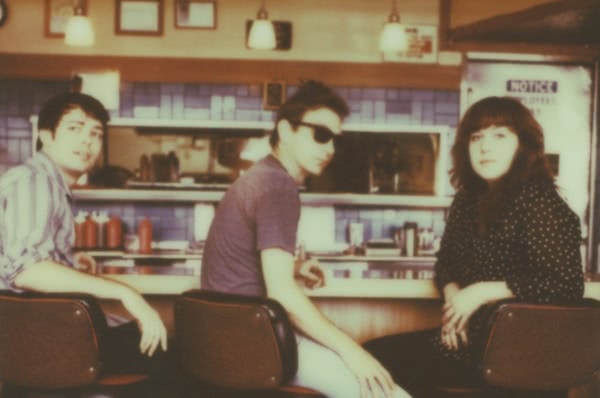When Sonny Smith was in his late teenage years, he packed his bags and headed to Central America. Smith found himself living in the jungle, writing screenplays for films he hoped would eventually see the light of day when he returned to the United States. “I was already a musician, but I thought of music more as a side thing, and that I was going to be directing movies and stuff,” Smith says.
Smith found, however, that his nascent screenwriting ideas began to morph into songs. “I started singing these long, rambling songs that had a lot of characters and a lot of dialogue, and sometimes would even have screenplay direction – ‘cut two!’, stuff like that,” Smith says. “So when I went back to San Francisco, I had more of a focus on being a songwriter. So Central America was really the pivotal place where that happened.”
Smith grew up in California’s Bay Area, before moving east to Colorado when he was about 17. Smith’s 2006 album, Fruitvale, looked back on his time living in the city of Oakland (Fruitvale being a district in Oakland with a high Latino population). Often dwarfed by the rich history and colourful artistic scene of neighbouring San Francisco, Oakland has played a pivotal – and occasionally violent – role in contemporary American history. It was there that Huey P. Newton and Bobby Seale formed the Black Panthers in the ’60s. In 1973, the Symbionese Liberation Army shot and killed a school official, and wounded another, as part of their radical political program.
“I don’t know if I have one feeling toward Oakland,” Smith says, when I ask what he thinks of the city these days. “It does seem to be getting more and more violent – San Francisco is as well. I think maybe because the affluence that’s happening in Oakland and San Francisco is making the difference between rich and poor even bigger. I just went through Fruitvale the other day, and it’s looking a lot different these days – it’s been gentrified a bit.”
By the time he did Fruitvale, Smith’s artistic pursuits had broadened to include visual arts, poetry and longer-form writing, as well as his songwriting and screenwriting activities. “I’ve noticed over the years that I will often be working on something – like a song – and I’ll see part way through that it’s really meant to be a play, or that I set out to write a play, and that it’s supposed to be a comic book. So to that extent they all come from the same place and they have to find their own identity, and I tend to be open to different mediums. So if a song isn’t working, rather than throwing it away, I’ll make it a drawing. And sometimes I’m surprised at what it becomes – it’s not always what I set out to do.”
In 2009, Smith embarked on his ambitious 100 Records project, in which he created 100 fictional bands, each with a single featuring an A-side and B-side written by Smith. Apparently, a Japanese label took interest in one of the bands and asked to put it on a compilation – not realising that it wasn’t a ‘real’ band.
“I can only vaguely remember that,” Smith laughs. “I think it was Danny Dusk & The Twilights. I’ve tried to put out a few of the bands as if they were regular bands, and I’ve got a lot of interesting emails in response.”
The sci-fi, psychedelic overtones of Smith’s latest album, Antenna To The Afterworld, render it a stark deviation to his previous country-styled album, Longtime Companion. While Smith does enjoy the challenge of artistic reinvention, it’s not necessarily a conscious pursuit. “I don’t set it as a goal, but it’s more of a by-product of me getting bored very easily – I have a very restless impatience with identifying with one thing. So I’ll get into country music, but even before I’m done I’ll be like, ‘I’m bored – what else interests me?’ It’s not so much an artistic manifesto – it’s more that I’ve got artistic short attention span,” he laughs.
Antenna To The Afterworld was written at a time when Smith was dealing with the grief and tragedy of the death of a close friend. Notwithstanding, Smith says the album was more about exploring the notion of death, and what lies beyond life, than engaging in a cathartic activity.
“I was certainly sad at the time, but the record wasn’t exploring grief at all – it was actually exploring more the curiosity of death and the afterworld,” Smith says. “There were a few contributing things that seemed to put death just around. Another friend had died; I’d gone to see a psychic – I was ‘visited’ by one of them. The afterworld was just all in the conversation of my mind. It was really just exploring the curiosity of that, rather than dealing with grief. But I hope that doesn’t make me seem cold!”
Despite his artistic and personal explorations, Smith says he doesn’t have a particular vision of the afterlife. “I have no idea what it is – I’m none the wiser after making a record about it. I have no clue what’s out there, and that’s kind of the beauty of it. Anything’s possible. I was talking to my son about aliens, and we were drawing pictures of them. Our human concept of what aliens are is pretty small – it’s just a reflection of ourselves.
“When you think about it, maybe the atoms that make up our planet are aliens, or emotions are aliens. Love could be an alien that sucks on your heart, that takes a couple of years to get rid of!” he laughs.
BY PATRICK EMERY
Sonny & The Sunsets play Pop-Friendzzzy at Goodgod Small Club with support from Surf City, Songs and Adults on Thursday November 21.Antenna To The Afterworldout now through Polyvinyl/Popfrenzy.

































